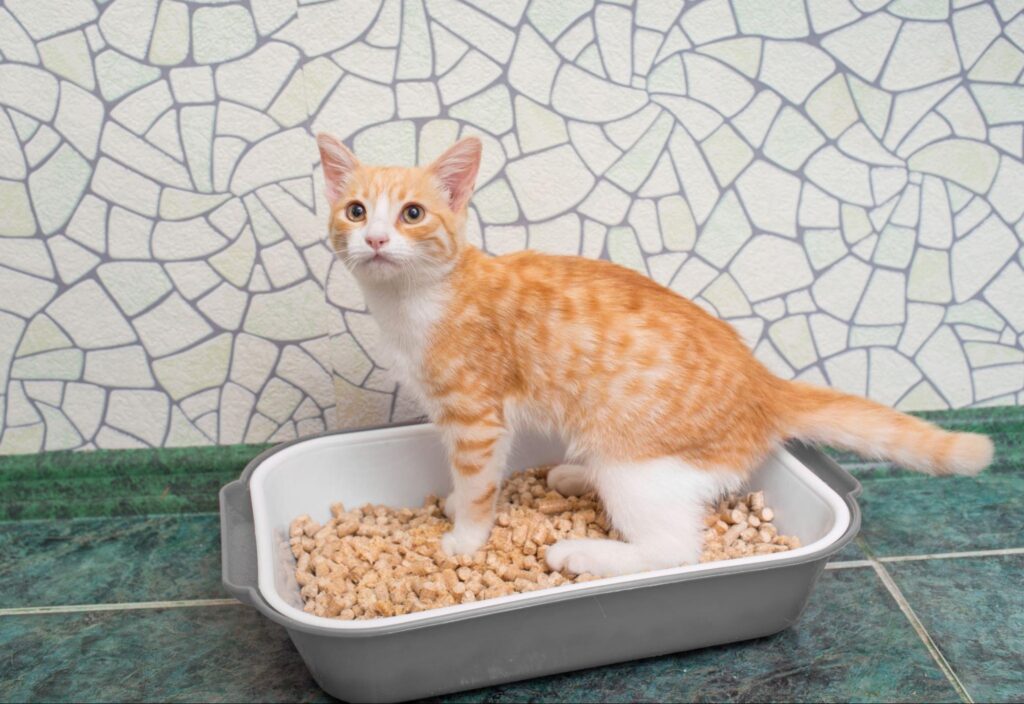If you have been a long-time cat owner, at some point in time you may have had to deal with a urinary tract infection (UTI) in your pet. Or maybe you are worried your cat has one now. It’s a valid concern that understandably bubbles up any time our cats start showing signs of discomfort during their bathroom visits.
If your cat has ever had a UTI, you probably wondered where it came from. Are cat UTIs contagious? Is there something you could have done to prevent it?
In this article, we’ll answer these questions and more. We address whether these infections are contagious, and whether other cats in your household are at risk.
Join us as we explore urinary tract infections in cats, demystify this condition and offer the peace of mind you are looking for.
Understanding Cat UTIs

A UTI is a bacterial infection in the urinary system, which can cause inflammation of the bladder (cystitis) or even lead to kidney failure if not treated. These infections cause significant pain and lead to difficult urination.
It is important to differentiate UTIs from a broader spectrum of conditions known as Feline Lower Urinary Tract Disease (FLUTD), which encompasses not only infections but also other issues like urinary stones, urethral obstruction, and feline idiopathic cystitis (inflammation of the bladder with an unknown cause). All of these conditions have similar symptoms.
UTIs are a relatively infrequent cause of FLUTD. In young cats, bacterial UTIs make up just 1-3% of FLUTD cases; this increases to around 10% for older cats that are more than 10 years of age.
Causes and Risk Factors
Urinary tract infections in cats develop when bacteria invade the urinary tract, causing infection and inflammation. The bacteria most likely to cause a UTI is known as E. coli, a common bacteria that is normally found in the digestive tract of cats and other animals.
The most direct route of infection is when the bacteria enter through the urethra and ascend to the bladder, where the bacteria multiply and set up infection. Less commonly, bacteria may get into the blood system, get filtered out by the kidneys and enter the urinary tract via that route.
Several factors can predispose cats to develop UTIs, including:
- Anatomical Factors: Female cats are more likely to get UTIs because they have shorter urethras. Cats with structural abnormalities in the urinary system, such as congenital defects or tumors, are also at increased risk.
- Weakened Immune System: Cats with weakened immune systems, whether due to age, existing health conditions, or the use of immunosuppressive medications, are more susceptible to infections, including UTIs.
- Bladder Stones or Crystals: These can cause irritation and inflammation of the urinary bladder and urethra, making it easier for bacteria to take hold and establish an infection.
- Incomplete Urination: If for some reason a cat doesn’t empty its bladder completely when urinating, the remaining urine can become a breeding ground for bacteria.
- Chronic Kidney Disease: This condition can affect the body’s ability to concentrate urine and flush out bacteria, increasing the risk of UTIs.
- Diabetes Mellitus: Cats with diabetes are at higher risk because the excess sugar in the urine can foster bacterial growth.
- Stress: Stress can weaken the immune system and may contribute to the risk of developing a UTI, although the direct link is more closely associated with FLUTD.
- Use of Catheters: The use of urinary catheters during medical procedures can introduce bacteria into the urinary tract.
- Poor Hygiene: In multi-cat households or shelters where litter boxes may not be cleaned frequently, the risk of UTI can increase due to increased exposure to bacteria.
Are Cat UTIs Contagious?

Given that the risk of UTIs may increase in multi-cat households or in cases where litter boxes are not kept clean, it is logical to assume that cat UTIs are contagious. But in fact they are not considered to be contagious under normal circumstances.
The bacteria that cause UTIs are not highly contagious like viruses or other bacteria. In a healthy cat with a strong immune system, the risk of developing UTIs from bacteria that came from another infected cat is very low.
However, in cases where a cat has a weakened immune system or suffers from any of the risk factors listed above, there may be a small increased likelihood of infection in situations where there are other cats around and when there are poor sanitary conditions.
Signs That Your Cat Has A UTI
The signs of a feline UTI are indistinguishable from other conditions encompassed by FLUTD. The clinical appearance of these conditions are similar across the different FLUTD causes.
This overlap makes it challenging for pet owners and sometimes even veterinarians to determine the specific underlying cause of a cat’s urinary distress without further diagnostic testing.
The following signs in your cat may indicate it has a UTI, but keep in mind that there are other possible causes for these as well.
Here are the key signs to watch for:
- Frequent Urination: Attempting to urinate more often than usual, but often only passing a small amount each time.
- Straining to Urinate: Showing signs of discomfort or prolonged effort while trying to urinate, which may be mistaken for constipation.
- Blood in the Urine: The presence of blood, making the urine appear pinkish, reddish, or even brown, is a clear sign of a problem.
- Urinating Outside the Litter Box: Cats may urinate outside their litter box because they associate the box with the pain of trying to urinate.
- Licking the Urinary Opening: Excessive licking of the genital area due to discomfort or pain.
- Crying or Vocalizing When Urinating: Indicating pain or distress while urinating.
- Lethargy: Decreased activity or interest in usual activities can be a sign of discomfort or illness, including a UTI.
- Unpleasant Smell of Urine: A strong or unusual odor to the urine can indicate infection.
These signs can signal UTIs or other urinary/medical problems. Consult a vet for diagnosis and treatment if your cat shows these symptoms. Early action can halt UTI progression to severe issues like kidney infections or urinary blockages.
Treatment and Prevention

Treatment
If your cat is diagnosed with a UTI, treatment typically involves antibiotics to clear the infection. Your veterinarian may also recommend pain relief medications to ease discomfort and dietary changes to support urinary tract health.
In some cases, further diagnostic tests such as urinalysis, urine culture, or ultrasound may be necessary to fully understand the extent of the infection and to rule out underlying conditions.
Prevention
Preventing UTIs in cats involves reducing risk factors as much as possible and creating a healthy environment for your cat’s bladder and urinary system.
Like in people, drinking plenty of water can help prevent UTIs in cats. Keep their water bowls clean and topped up, and consider placing several water bowls around your home to provide easy access. Cat water fountains can often encourage cats to drink more.
Equally important is keeping the litter box clean; regular cleaning helps reduce the concentration of bacteria in the environment. In houses with multiple cats, having multiple litter boxes is recommended to prevent overcrowding.
Diet is also important. A balanced diet that supports urinary health is always a good idea. Special or prescription diets may be recommended for cats with a history of urinary tract problems.
Stress reduction is another key factor. Keeping your cat’s environment calm and free from stress by offering hiding spots, stimulating toys, and consistent interaction can contribute significantly to their overall health.
Finally, routine veterinary check-ups can mean early detection of possible problems, allowing timely intervention before issues worsen.
Remember, prompt treatment is critical for UTIs, as untreated infections can progress and lead to more serious health issues. If you suspect your cat has a UTI or is showing any signs of urinary distress, it’s important to consult your veterinarian right away.
A Final Word
UTIs in cats can be uncomfortable for both the cat and worrisome to their owner. If you suspect your cat has a UTI or is showing symptoms of urinary discomfort, do not hesitate to contact your veterinarian. Early detection and treatment are key to a swift recovery.
With the insights and strategies we’ve discussed, you are now better equipped to recognize the signs of urinary troubles, approach treatment options wisely, and implement preventative measures effectively.
Remember, giving your full attention and taking proactive steps can greatly impact your cat’s urinary health and overall well-being. Cheers to the health and happiness of your beloved pets!

Dr. Wendy Wilkins is an experienced veterinarian and epidemiologist with over 20 years of expertise. She holds a Doctor of Veterinary Medicine (DVM) degree and a Doctorate in Epidemiology from the University of Saskatchewan. Throughout her career, Dr. Wilkins has excelled in clinical practice, academia, research, and regulatory veterinary medicine. She is a respected voice in knowledge dissemination, delivering factual information in a readable and understandable manner through articles, books, and public engagements.

